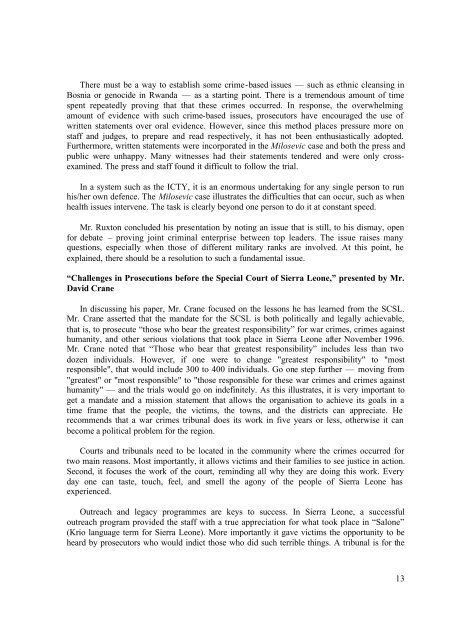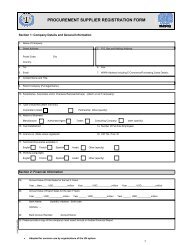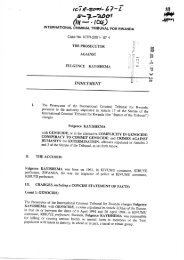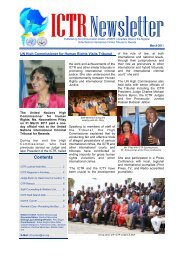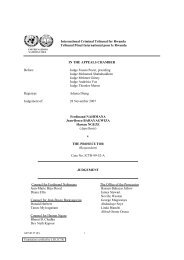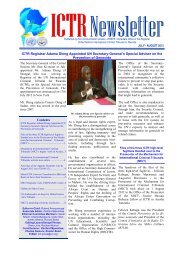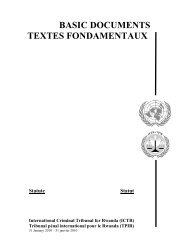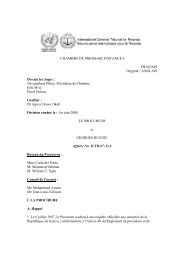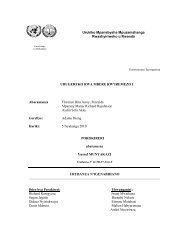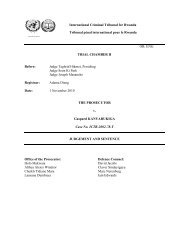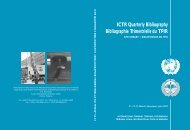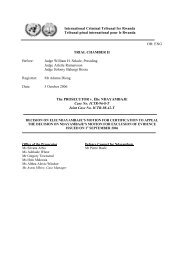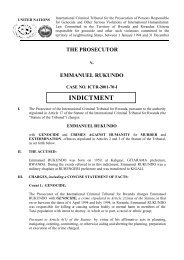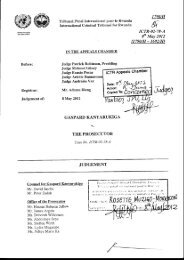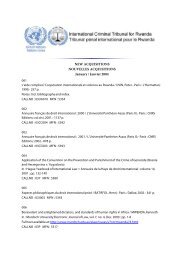Report of Proceedings - International Criminal Tribunal for Rwanda
Report of Proceedings - International Criminal Tribunal for Rwanda
Report of Proceedings - International Criminal Tribunal for Rwanda
Create successful ePaper yourself
Turn your PDF publications into a flip-book with our unique Google optimized e-Paper software.
There must be a way to establish some crime-based issues — such as ethnic cleansing in<br />
Bosnia or genocide in <strong>Rwanda</strong> — as a starting point. There is a tremendous amount <strong>of</strong> time<br />
spent repeatedly proving that that these crimes occurred. In response, the overwhelming<br />
amount <strong>of</strong> evidence with such crime-based issues, prosecutors have encouraged the use <strong>of</strong><br />
written statements over oral evidence. However, since this method places pressure more on<br />
staff and judges, to prepare and read respectively, it has not been enthusiastically adopted.<br />
Furthermore, written statements were incorporated in the Milosevic case and both the press and<br />
public were unhappy. Many witnesses had their statements tendered and were only crossexamined.<br />
The press and staff found it difficult to follow the trial.<br />
In a system such as the ICTY, it is an enormous undertaking <strong>for</strong> any single person to run<br />
his/her own defence. The Milosevic case illustrates the difficulties that can occur, such as when<br />
health issues intervene. The task is clearly beyond one person to do it at constant speed.<br />
Mr. Ruxton concluded his presentation by noting an issue that is still, to his dismay, open<br />
<strong>for</strong> debate – proving joint criminal enterprise between top leaders. The issue raises many<br />
questions, especially when those <strong>of</strong> different military ranks are involved. At this point, he<br />
explained, there should be a resolution to such a fundamental issue.<br />
“Challenges in Prosecutions be<strong>for</strong>e the Special Court <strong>of</strong> Sierra Leone,” presented by Mr.<br />
David Crane<br />
In discussing his paper, Mr. Crane focused on the lessons he has learned from the SCSL.<br />
Mr. Crane asserted that the mandate <strong>for</strong> the SCSL is both politically and legally achievable,<br />
that is, to prosecute “those who bear the greatest responsibility” <strong>for</strong> war crimes, crimes against<br />
humanity, and other serious violations that took place in Sierra Leone after November 1996.<br />
Mr. Crane noted that “Those who bear that greatest responsibility” includes less than two<br />
dozen individuals. However, if one were to change "greatest responsibility" to "most<br />
responsible", that would include 300 to 400 individuals. Go one step further — moving from<br />
"greatest" or "most responsible" to "those responsible <strong>for</strong> these war crimes and crimes against<br />
humanity" — and the trials would go on indefinitely. As this illustrates, it is very important to<br />
get a mandate and a mission statement that allows the organisation to achieve its goals in a<br />
time frame that the people, the victims, the towns, and the districts can appreciate. He<br />
recommends that a war crimes tribunal does its work in five years or less, otherwise it can<br />
become a political problem <strong>for</strong> the region.<br />
Courts and tribunals need to be located in the community where the crimes occurred <strong>for</strong><br />
two main reasons. Most importantly, it allows victims and their families to see justice in action.<br />
Second, it focuses the work <strong>of</strong> the court, reminding all why they are doing this work. Every<br />
day one can taste, touch, feel, and smell the agony <strong>of</strong> the people <strong>of</strong> Sierra Leone has<br />
experienced.<br />
Outreach and legacy programmes are keys to success. In Sierra Leone, a successful<br />
outreach program provided the staff with a true appreciation <strong>for</strong> what took place in “Salone”<br />
(Krio language term <strong>for</strong> Sierra Leone). More importantly it gave victims the opportunity to be<br />
heard by prosecutors who would indict those who did such terrible things. A tribunal is <strong>for</strong> the<br />
13


